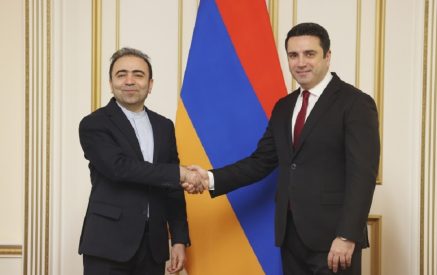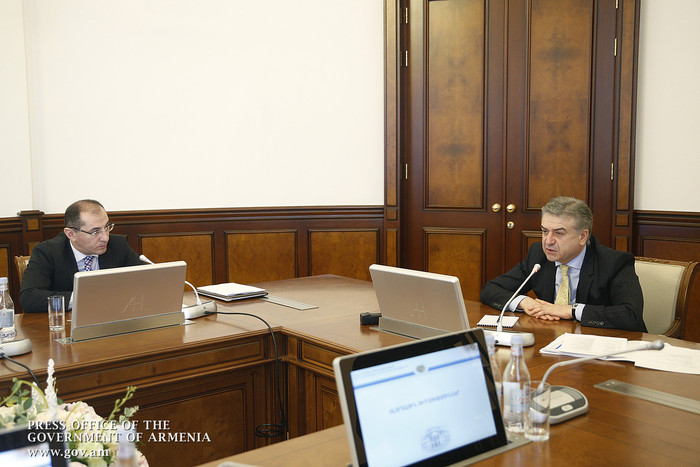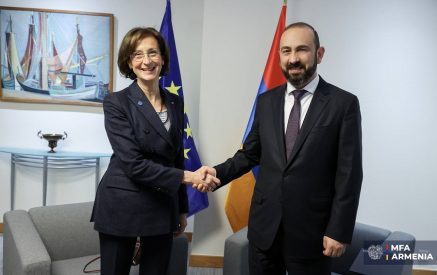Prime Minister Karen Karapetyan visited the Ministry of Finance to get acquainted with the activities and priorities completed in 2017, as well as the tasks set for 2018.
Minister Vardan Aramyan reported that in the period under review, the Ministry of Finance implemented measures aimed at improving the macro-environment, fiscal policy and microfinance, public finance management efficiency.
The tasks that had been set in the context of fiscal policy, i.e., checking the public debt growth, ensuring macroeconomic stability, creating prerequisites for ushering in FY2018 with higher economic potential were by far implemented.
In 2017, greater emphasis was placed on capital expenditure and a more conservative behavior on current expenses. V. Aramyan said that in 2018, a fiscal rules package has been developed to introduce new fiscal rules aimed at stabilizing debt without hampering the economic growth, on the basis of which it is envisaged to revise the currently applicable rules of debt and deficit management, as well as to define new fiscal rules on state budget expenditures.
In the field of public finance management, the Ministry implemented 2 group activities aimed at raising financial discipline (simplification and expansion of information systems). This trend will be maintained in 2018 in terms of both short-term and long-term results.
The Minister reported that the share of information systems in the field of public procurement has been enhanced, and the number of those customers using the system has increased three times. V. Aramyan informed that in 2017, the Ministry was active in raising public awareness, and steps have been taken to attract qualified personnel to the staff. 137 young specialists have been recruited by the Ministry.
Then the responsible officials briefed Prime Minister Karapetyan on the works carried out in specific areas. First of all, measures were implemented in the spheres of macroeconomic policy, budgetary framework and public debt management. The estimates of the Ministry of Finance evidence that in 2017 economic growth will amount to around 6.7 percent (predicted 4.3 percent), the GDP deflator growth – 1.5 percent, and the per capita GDP – about USD3,799.8.
The 6.7 percent economic growth was driven by higher than expected indicators in services, construction and net taxes. In terms of foreign trade, as compared to the previous year, exports will grow by around 23.5 percent and imports – by about 28 percent. As of the end of the year, the rise in remittances is estimated at 13.4 percent.
The current account deficit will make about 4% of GDP, approaching its long-term balance. In 2017, State budget revenues amounted to 1237.2 billion drams, 5.6% up against the same period last year. Tax revenues and duties totaled 1158.1 billion drams, exceeding the index of the same period of the previous year by 7.3%. The tax receipts/GDP ratio was about 21.1%, with the actual taxes/GDP index standing at 20.8^%, which is 0.5 percentage points higher than last year.
Total expenditures in 2017 made 1417.3 billion drams, dropping by 2.2% against the previous year; current expenditures decreased by 1.2% and capital expenditures by 13.0%. Owing to restrictive fiscal policy, the State budget deficit amounted to 180.2 billion drams or 3.3% of GDP against the 5.5% recorded in the previous year.
Prime Minister instructed to inform the public about the State budget surplus in 2017. “We have the responsibility to enforce and implement the budged law, and we have over-fulfilled our task; therefore, we must inform the public about it. We are accountable for the budget that the National Assembly has approved.” As regards the actual budget, the Prime Minister said that it is a document for internal use, and thereby “sets motivational targets.”
The meeting next reviewed the measures implemented in the field of public debt management with a view to developing the primary and secondary market bonds, extending debt repayment deadlines, introducing a system of market participants’ behavior assessment and election system, transparency of debt policy, and so on. In 2018, efforts will be made to activate and develop the secondary market and improve the management of public debt.
The Head of Government referred to existing credit and grant programs and instructed the Ministry of Finance to submit a complete document on all projects.“We have to be sure that we get the most of the grants the country can possibly receive. Today, I do not see this signal in summary. Please be advised that this is to be organized in the Ministry of Finance so that an action plan is out for 2018, where every one will know what to do, what bonus they can get, and what is the responsibility for failure.”
Karen Karapetyan also stressed the need to revise some programs: “We have to take stock of all our credit programs, look at their performance and, if it is possible, reconsider our loan commitments.”
The Prime Minister was reported on the results of the Ministry’s per-sector activities. In particular, the ministry officials touched upon the improvement of tax legislation and the development of international cooperation between the tax authorities, which is expected to continue in 2018. The Premier instructed the Ministry of Finance to develop a mechanism for filtering all those laws related to finance, even if the author is not the Ministry of Finance.
The meeting next referred to the process of program budgeting, within the framework of which in 2018 it is expected to raise the transparency of SNCO activities and negotiate with donor organizations concerning with PIU activities, as well as to apply pre-control systems.
Detailed information was also provided about the work done in the field of public procurement. In 2017, the range of customers of the system of electronic procurements has been expanded, with 30% improved participation in procurement.
The following measures are planned for 2018: introduction of electronic auction system, introduction of electronic systems for procurement analysis and risk assessment, continuous development of electronic procurement system (new ARMEPS), expansion of electronic procurement system (involving more than 200 million dram spending SNCOs), as well as procurement and treasury electronic systems integration.
The Prime Minister expressed satisfaction with the steps taken and focused on the issues raised by some procurement agencies. “Many casual entities come around, take part in tenders, set up dumping prices in search of pre-qualification, but the Ministry of Finance says that pre-qualification would lead to the fact that the circle of participants might be narrowed and the cost increased. At yesterday’s Cabinet sitting, my assignment referred to this issue so that we could find the point of crossing. Please, think about it, let us resolve the problem. We need to develop the most flexible mechanism so that these restrictions could not prevent us from buying the cheapest high-quality service. I would ask you to respond as flexibly and promptly as possible,” the Head of Government said.
Summing up the consultation, Prime Minister Karapetyan specified the Ministry’s priorities in 2018: “2018 is a landmark year. First of all, our financial discipline: the pursuit of costs should be highly consistent, reduced to mere necessity. Second, this year we have to lay the foundations for long-term sustainable growth, capital investment and other costs. Third, we will have to give the 2019 budget a new status. Fourth, we need to have a unit in the chain of our borrowing policy that would control and give signals about what is going on. Fifth, we should think about the public administration system’s reform.”





















































